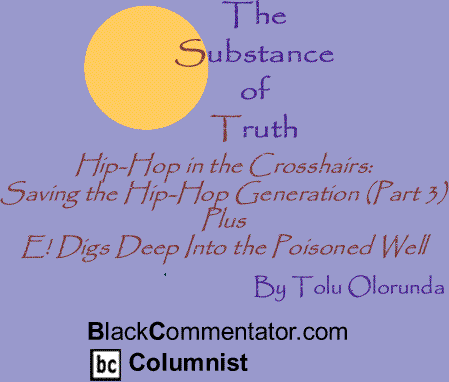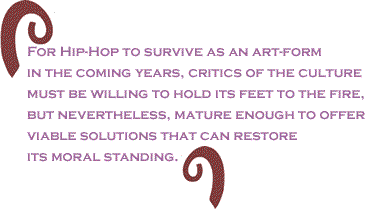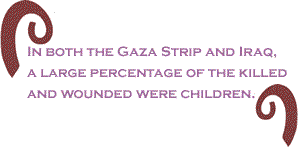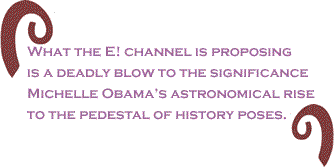
|
|||||||||||||||||||||||

|
|

Custom Search
|
|
 |
|
|
In the coming years, a future of immense possibilities awaits the Hip-Hop generation. Hip-Hop culture and music has a responsibility to maintain its role as the “CNN of Black people.” With the current state of Hip-Hop, and a stigma of discouragement confronting listeners of all stripes, certain strategies must be adopted to help steady the ship, and elevate Hip-Hop back to its rightful throne as the megaphone of conscience for Black, Brown, Yellow, Red, and White disenfranchised peoples across the globe. If Hip-Hop is to survive this brewing storm, and emerge victorious, critics, fans, and scholars must be mindful of three factors which, I believe, can sustain the prophetic balance of Hip-Hop in these trying times.
The promises of Hip-Hop culture can only yield substantive offerings if the hymns of courage are sang across the Hip-Hop universe. Artists, listeners, and critics all have a part to play in helping balance the pulse of Hip-Hop. It would take the unmitigated support for female artists whose past experiences strengthen their commitment to advancing tougher measures for domestic-violence laws. It would take the encouragement of artists who, with the soul of a rebel, remind millions of people around the world of the unchanged conditions the black mass is entrapped in, and expose the antics of those who have been given “permission to go down and shoot” victims of criminal-ineptitude.
Mainstream Hip-Hop artists have, over time, expressed a yearning to articulate political viewpoints that, often, fall outside of the mainstream of public opinion – if given the chance and support. Take for example the Rap artist, Kanye West, who in a 2003 song declared that, “Racism [is] still alive, they just be concealing it;” or the Chicagoan native, Lupe Fiasco’s public confessions to abstinence from smoking, drinking, and corresponding sponsorship, as a sign of devotion to his Muslim faith. We can also acknowledge the audacity of the Rap duo, The Clipse, which, in 2006, apologized to fans for a long-delayed album because “those crackers weren’t playing fair at Jive.” Shortly after the single which featured those words, the album release date was again pushed back – leading one of its members to profess his hatred for the label with “all my heart and all the passion and my soul.” Hip-Hop artists have the capability to transform their existence, and that of the listening audience, into a stream of unending possibilities. To save the Hip-Hop generation, and straighten the fabric of this existential art-form, all concerned individuals and parties must possess the humility to observe; patiently interrogate; and dutifully render solutions to the many problems confronting it. E! Digs Deep Into the Poisoned Well “Stupid... reality shows do not amuse us - Hip-Hop artist, Canibus, For Whom the Beat Tolls Oh, yes! Just what we need at this momentous period in Black history – at the crossroad of a Black man rising to the highest seat of the land, with a wife whose grace, dignity and integrity has become a beacon of inspiration to women of color around the world. At this junction, the Entertainment channel, E!, sees fit to revisit the ghosts of the not-so ancient past. E! has announced its plans to feature a competitive reality-show called, “Candy Girls.” [Context: By no means are these girls and, of course, no candy of any sort is being advertised by E!]. Packaged as a good intention, with a desire to assist video vixens/models who aspire “to reach the career pinnacle of appearing in ‘A-list’ music videos and gain access to the world of superstars, private jets and exclusive parties,” E! requires that all participants be able “to play the game as well as you look.” To position themselves as God’s mercenary to the Womanist/Feminist community, E! has taken the liberty to inform willing contestants that, “musicians need to live their image and that includes surrounding themselves with the beautiful women who are so often featured in their videos at all times. However, like runway models, these women know they need to get in early and make their money fast before time takes away the looks that make them so successful.” [Emphasis mine] The show is slated to premier right after “Keeping up with the Kardashians” – how fitting. E! is certainly not the first media outlet to engage in such debacle. The scene is an all-too-familiar one for those engaged in the struggle to end misrepresentation of womanhood in entertainment: A white network, bored out of limited options and thinning inspiration, recruits Black females to whore themselves in exchange for temporary fame and fleeting popularity. Ain’t nothing new here. It’s the same ole’ ball-game. Some might argue, a national past-time. What does create more discord than previous instances, however, is the juxtaposition of E!’s experiment to Michelle Lavaughn Robinson Obama’s rise to international prominence. With the ascendancy of First lady Michelle Obama, a distinguished lawyer and public servant, nothing comes off more appalling than the effrontery of E!, in continuing the centuries-old tradition of reducing Black females to one-dimensional characters, whose promiscuity and hyper-sexuality is sentenced to death by a thousand qualifications, in the court of public opinion. Unsuccessfully masquerading its deceitful desires by deeming the contestants “beautiful women,” as opposed to “puns,” E! is simply borrowing a page from VH1, MTV and BET.
In less than a decade, the Viacom-owned trio have successfully erased nearly-all traces of social-awareness in the younger generation, and nurtured it with a healthy diet of scantily-clad-women-focused reality shows. “Flavor of Love,” hosted on VH1 since January 2006, is perhaps the most popular and regrettable of its kind. As those familiar with the theme’s show would acknowledge, VH1 accomplished, in three short seasons, what very few TV-networks have been able to. In the years Flavor of Love ran on the network, and was picked up by subsidiaries worldwide, it effectively established itself as the regulator for 21st century reality-show-based-exploitative-renditions of Black Womanhood. With a certified coon (Flavor Flav) as the host, VH1 propagated the centuries-old lie that Black Women are over-sexualized objects with an insatiable appetite for lust-based pleasures only. Before long, Black Women in European countries began reporting of the hazardous effects these shows were having on their self-esteem. Many noted that men (mostly white), in those countries, had, as a result of the graphic images broadcast around the world, come to associate them with the sexual practices promoted on the shows. Using commercial Rap music artists as the buffer to prolong the existence of this untruth, networks like MTV, BET, E!, VH1 seek to justify their criminal antics with the claim that such activities are an integral part of Hip-Hop, to begin with. It is a lie worthy of lethal refutation. Selective-listening seems to be the supreme inspiration of any such rationale. For if these channels were to dig deeper into the well of Hip-Hop, and pass the shallowness and filth that comprises the majority of commercial/chart-topping Hip-Hop, they would certainly find artists that put an indelible dent on their theory. Well-known cross-generational and cross-gender Hip-Hop artists such as Afrika Bambaataa, Roxanne Shante, Dead Prez, Nefertiti, NYOIL, MC Lyte, Black Star, Lauryn Hill, Black Star, Queen Latifah, KRS-One, Invincible, Jasiri X, Jean Grae etc., are an everlasting invalidation of all suggestions that Hip-Hop culture is a cesspool of misogyny. The skill of devious corporate media channels, like E!, lies in their inherent ability to sample unfortunate fragments of commercial Hip-Hop, and expand or plaster them over an overblown layer. Commercial Hip-Hop artists are not genuine representations of true Hip-Hop culture – neither are they spokespersons for the community. Criminal-minded corporations, however, neglect this reality with intense delicacy. After all, the pimping and devaluation of Black (and all) Womanhood is hardly successful if an admission of this fact is afforded.
What the E! channel is proposing is a deadly blow to the significance Michelle Obama’s astronomical rise to the pedestal of history poses. If possible, they seek to siphon all inspiration derivable from seeing a Black Woman glow with dignity, spirit and elegance, on an international stage. Many Black Women and girls, who, for decades and centuries, have been compelled to administer skin-bleaching creams, for a desire to appear lighter, or felt undeserving of love and appreciation, for lack of long hair, now have a dark-skinned, short-haired Woman as the new face of Black America, and the Black world! E!, and its counterparts, cannot afford the inevitable – a reorientation of Black female consciousness. To impede what seems to be unavoidable, E! has now decided to inform Black Women of how irrelevant Michelle Obama should be to their formation of self-identity. Instead, “‘Video Vixenry’ is where it’s at!” What Black (and all) Womanists and Feminists still possess is the power to resist and refuse all distorting forms of Black (and all) femininity. Whether E!’s reality show turns out successfully or not is of little interest to this writer. The most important lesson is that through critical and vocal opposition to the avaricious interests of commercial media channels, this battle can still (and must) be won. BlackCommentator.com Columnist, Tolu Olorunda, is an 18-year-old local activist/writer and a Nigerian immigrant. Click here to reach Mr. Olorunda. |
|
Any BlackCommentator.com article may be re-printed so long as it is re-printed in its entirety and full credit given to the author and www.BlackCommentator.com. If the re-print is on the Internet we additionally request a link back to the original piece on our Website. Your comments are always welcome. eMail re-print notice
If you send us an eMail message we may publish all or part of it, unless you tell us it is not for publication. You may also request that we withhold your name. Thank you very much for your readership. |
|
| |
|


































